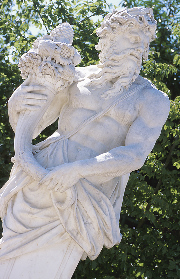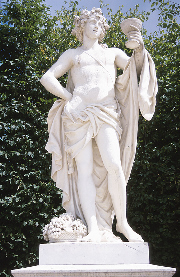I’ve been reflecting on some of the archetypes prevalent in our society, particularly in relation to ‘mythological’ connections. Even more specifically, in relation to the pantheon of gods in Greek mythology.
 If we have any mythological connection at all these days, it seems to be with spirits of Apollo (the god of reason and the clear light of day) and Prometheus (the god of production, crafting and technology).
If we have any mythological connection at all these days, it seems to be with spirits of Apollo (the god of reason and the clear light of day) and Prometheus (the god of production, crafting and technology).
These, if any, are the gods we honour and the myths we live by. Many – if not most – of the other gods are relegated to our community shadow.
Drawing on Jung’s psychological theories, delegation of any quality or trait into the shadow part of the psyche will cause its influence to explode elsewhere in more unconscious and damaging ways.
The gods we dishonour make their influence felt in pathological ways, and leave us off balance and out of harmony with our place in the world.
Just as the ancient Greeks knew that a balanced life involved honouring a pantheon of different gods, we need to invite other forces and myths back into our society to regain our balance.
A good start might be to re-establish our connection with the qualities of Eros or Dionysos. The positive aspects of these gods are among those crucial to our successful negotiation of our path forward in this modern world.
The myth of Eros is that of creativity – the life-impulse. He is the god of relationship, and we experience him in both the pain and delight of real intimacy. Bringing more of the Eros influence into our organisations and social structures implies improving relationships and interconnectedness.
What’s more, Eros ‘pathology’ – the shadow aspect of Eros – is certainly evident in many areas of our society, in its levels of irresponsibility, self-indulgence, and rampant individualism. Eros is the puer or eternal youth, and unless consciousness recognises and honours this element, unconsciousness can produce an unwillingness to grow up.
Dionysos brings fun, impulse, ecstasy and the irresistible irrational into our lives. He is the ‘great loosener’. Eccentricity, improvisation, personal satisfaction, joy, ecstasy, choice, and laughter are all the realm of Dionysos. He is the god who warns us against taking ourselves or life too seriously – and can provide a much needed balance to the ‘heavier’ aspects of Apollo and Prometheus.
 Dionysos’ imprisonment in the shadow is revealed in many pathological expressions of his influence in our society. Where people seem to be achieving personal satisfaction or goals at the expense of those around them, where eccentricity is carried way beyond the bounds of social acceptance, or where the search for joy, fun and excitement turns to self-harm – in all these and more we see Dionysos shouting for recognition.
Dionysos’ imprisonment in the shadow is revealed in many pathological expressions of his influence in our society. Where people seem to be achieving personal satisfaction or goals at the expense of those around them, where eccentricity is carried way beyond the bounds of social acceptance, or where the search for joy, fun and excitement turns to self-harm – in all these and more we see Dionysos shouting for recognition.
Perhaps the drug ‘Ecstasy’ was not named by accident – it is a very appropriate symbol for the destructive powers of Dionysos dishonoured!
In the end, Eros, Dionysos and all the other gods will need to be invited to join Apollo and Prometheus as the guardians and designers of our modern destiny. Without them our development – and our psyche – remains out of kilter.
How society has shifted, through the institutionalization of college for the masses, the maturation process is a fascinating shadow in modern culture. In the rural valley where I live, for over 150 years youths would find their adulthood easily by the age of sixteen.
So true! And we tend to lack rituals to mark the milestones of the maturing process too. At least, those with any solemnity or sense of the ‘sacred’ in its broadest sense. 18th or 21st birthday parties often exhibit the shadow side of Eros for example. I wonder if this is partly why there has been a resurgence (at least here in Australia) of the debutante balls that were prevalent in an earlier age but had since died out? An attempt to reclaim and regain a more significant ritual to celebrate the onset of adulthood.
As ridiculous as this sounds, what you seem to be saying here is we have to learn to have fun again! To *enjoy* life and to make it less of a toil to the grave interspersed with brief moments of joy. An attitude that I am all for!
The idea of a community shadow is so true and yet so terrifying to me. You mean once I’ve sorted my own mess out, I still have to keep pushing against *external* internal daemons too?! ;) Though I do have this lovely image in my head of some people who have figured out that having more Dionysus in their life is a beautiful thing showing up like sparks in the darkness of the community shadow, eating it alive from from the inside out….
Thanks for your great post–I always love finding someone else who thinks myth is important and relevant and alive! today.
Absolutely! Fun and laughter are so important – when they nourish the spirit rather than draining it. (I mention that to filter out the kind of ‘fun’ or laughter some folk engage in, which is at the expense of others.)
I love your image of ‘sparks in the darkness of the community shadow’. The more we focus on those points of light and allow them to ignite new sparks, the less room there is for darkness. Mind you, I also think there must be room for both. It’s often in the darkness that we find new strength and new understanding. So the shadows must be honoured and appreciated too. :)
You know, this is the part I always trip over. Clearly it is important to have light and dark and to be ok with each. But if one of the things that we should try for is to bring pieces of ourselves up from the shadow and into light…to make them a part of ourselves on the path to integration, to cultivate them and use those less-polished skills and temperaments until they are polished….then what happens to the darkness? If duality falls away, is not everything light or good or simply *is*? And yet there is still dark and light in the world and I am still me and not you.
Or is the bit that I am missing in my idealistic mind the fact that this little ‘integration’ concept isn’t something that can be worked out in an afternoon? ;)
Yes, I think getting it all straightened out in one afternoon is perhaps a little ambitious! :)
I think it’s probably a bit of a paradox – bringing things out of our shadow into the light of day doesn’t make the shadow disappear – there is still light and there is still dark. And from my perspective, there will always be more to explore in both.
I wrote about the ‘mandorla’ on the “About” page of this blog – for me it’s a powerful symbol. It’s rather like the Yin and Yang concept really. Whenever opposites come together, including light and shadow, in one is the seed of the other. We just need to find enough courage and patience to sit comfortably with both. :-)